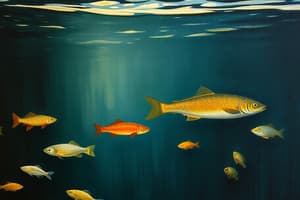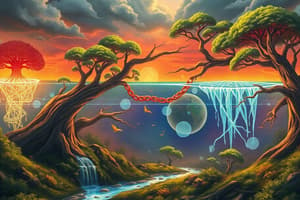Podcast
Questions and Answers
What is a potential impact of microplastic pollution on marine ecosystems?
What is a potential impact of microplastic pollution on marine ecosystems?
- Increased biodiversity
- Enhancement of habitat stability
- Disruption of marine food webs (correct)
- Improved water clarity
Which of the following is a direct effect of plastic pollution on marine wildlife?
Which of the following is a direct effect of plastic pollution on marine wildlife?
- Wildlife entanglement and ingestion (correct)
- Increase in fish populations
- Enhanced breeding opportunities
- Reduction of water temperature
What is one key strategy in rewilding to restore ecosystems?
What is one key strategy in rewilding to restore ecosystems?
- Promoting intensive farming practices
- Species reintroduction of keystone species (correct)
- Introducing non-native species
- Limiting public access to green spaces
What does habitat restoration aim to achieve in the context of rewilding?
What does habitat restoration aim to achieve in the context of rewilding?
What is one component of rewilding urban areas?
What is one component of rewilding urban areas?
What distinguishes an open system in the context of ecosystems?
What distinguishes an open system in the context of ecosystems?
What is the primary source of energy for most ecosystems on Earth?
What is the primary source of energy for most ecosystems on Earth?
Which organisms are primarily responsible for energy transfer in food chains?
Which organisms are primarily responsible for energy transfer in food chains?
What roles do decomposers play in ecosystems?
What roles do decomposers play in ecosystems?
What is the main difference between autotrophs and heterotrophs?
What is the main difference between autotrophs and heterotrophs?
In the context of food webs, what do herbivores primarily do?
In the context of food webs, what do herbivores primarily do?
Which bacteria are involved in producing energy in sunlight-limited environments?
Which bacteria are involved in producing energy in sunlight-limited environments?
What is the role of producers in an ecosystem?
What is the role of producers in an ecosystem?
What determines whether an ecosystem functions as a carbon sink or source?
What determines whether an ecosystem functions as a carbon sink or source?
How does deforestation impact the carbon cycle?
How does deforestation impact the carbon cycle?
What is one effect of fossil fuel combustion on the carbon cycle?
What is one effect of fossil fuel combustion on the carbon cycle?
During which season do CO2 levels typically decline in the atmosphere?
During which season do CO2 levels typically decline in the atmosphere?
What happens when the rate of CO2 release exceeds the capacity of carbon sinks?
What happens when the rate of CO2 release exceeds the capacity of carbon sinks?
What role does photosynthesis play in the carbon cycle?
What role does photosynthesis play in the carbon cycle?
Which process primarily releases CO2 as organic compounds are broken down?
Which process primarily releases CO2 as organic compounds are broken down?
What characterizes ecosystems with high respiration rates in relation to the carbon cycle?
What characterizes ecosystems with high respiration rates in relation to the carbon cycle?
What is the primary role of aerobic respiration in relation to photosynthesis?
What is the primary role of aerobic respiration in relation to photosynthesis?
Which factor contributes to ecosystem stability the most?
Which factor contributes to ecosystem stability the most?
What is a tipping point in the context of ecosystem stability?
What is a tipping point in the context of ecosystem stability?
How do photosynthesis and aerobic respiration interact within ecosystems?
How do photosynthesis and aerobic respiration interact within ecosystems?
Which of the following ecosystems is often cited as a stable ecosystem example?
Which of the following ecosystems is often cited as a stable ecosystem example?
What does the recycling of chemical elements within ecosystems ensure?
What does the recycling of chemical elements within ecosystems ensure?
What effect does severe weather have on ecosystem stability?
What effect does severe weather have on ecosystem stability?
What is a consequence of deforestation in terms of ecosystem stability?
What is a consequence of deforestation in terms of ecosystem stability?
What happens when deforestation occurs at a higher rate in a forest ecosystem?
What happens when deforestation occurs at a higher rate in a forest ecosystem?
What is a keystone species?
What is a keystone species?
Which of the following factors can contribute to the instability of ecosystems due to unsustainable harvesting?
Which of the following factors can contribute to the instability of ecosystems due to unsustainable harvesting?
What is the primary concern of sustainable harvesting in natural ecosystems?
What is the primary concern of sustainable harvesting in natural ecosystems?
How can soil erosion affect agricultural sustainability?
How can soil erosion affect agricultural sustainability?
What is one of the main effects of eutrophication on ecosystems?
What is one of the main effects of eutrophication on ecosystems?
What is the process of biomagnification?
What is the process of biomagnification?
Which agricultural practice can lead to a decline in soil matter?
Which agricultural practice can lead to a decline in soil matter?
Flashcards are hidden until you start studying
Study Notes
Ecosystems as Open Systems
- Ecosystems are open systems where energy and matter are exchanged with the surroundings.
- Examples: Tropical rainforests and grasslands.
Sunlight and Ecosystems
- Sunlight is the primary energy source for most ecosystems.
- Photosynthesis: Green plants convert sunlight into chemical energy.
- Producers: Plants are called producers for converting energy into a usable form for other organisms.
- Chemosynthetic organisms: In environments with limited sunlight, these organisms use inorganic compounds like minerals and sulfur for energy.
Energy Flow
- Food chains: Shows the transfer of energy from one organism to another.
- Herbivores: Consume plants, extracting energy from stored organic compounds.
- Carnivores: Feed on herbivores, continuing energy transfer up the food chain.
Role of Decomposers
- Decomposers break down dead organisms and organic matter.
- Important role in nutrient cycling: They extract energy and nutrients from decaying materials.
- Without decomposers: Ecosystems would be overwhelmed with dead organisms and waste.
Autotrophic vs. Heterotrophic Nutrition
- Autotrophs: Organisms that produce their own organic molecules using external energy sources (e.g., sunlight or inorganic compounds).
- Heterotrophs: Organisms that obtain energy and nutrients by consuming other organisms or organic matter.
Trophic Levels
- Organisms are classified into trophic levels based on their position in a food chain or web.
- Producers: First trophic level (e.g., plants).
- Consumers: Second trophic level (e.g., herbivores) and higher levels (e.g., carnivores).
- Decomposers: Break down dead organisms, not part of the linear food chain.
Factors Affecting Ecosystem Stability
- Energy supply: Ecosystems need a constant energy source for life processes.
- Nutrient recycling: Continuous recycling of nutrients sustains population productivity.
- Biodiversity: Higher diversity promotes resilience to disturbance and increases stability.
- Climatic factors: Ecosystems with severe weather conditions are less likely to be stable.
Tipping Points and Deforestation
- Tipping point: A critical point where changes in an ecosystem become irreversible.
- Deforestation: The removal of forests can push ecosystems past their tipping point.
- Amazon rainforest: Deforestation can lead to loss of biodiversity, changes in rainfall patterns, and decreased carbon absorption.
Carbon Cycle
- Photosynthesis: Autotrophs remove CO2 from the atmosphere and incorporate it into organic compounds.
- Cellular respiration: Organisms release CO2 back into the atmosphere.
- Carbon sinks: Ecosystems absorb more CO2 than they release (e.g., forests).
- Carbon sources: Ecosystems release more CO2 than they absorb (e.g., decaying organic matter).
- Deforestation: Impacts carbon cycles by reducing carbon sinks.
- Fossil fuel combustion: Increases atmospheric CO2 concentration and contributes to climate change.
Keeling Curve
- Short-term trends: Show seasonal fluctuations in CO2 levels due to photosynthesis and respiration.
- Long-term trends: Demonstrate a consistent increase in CO2 levels over time.
Significance of Photosynthesis and Aerobic Respiration
- Photosynthesis releases oxygen: Essential for aerobic respiration.
- Aerobic respiration consumes oxygen and releases carbon dioxide: Used for photosynthesis.
- Reciprocal relationship: These processes sustain life on Earth.
Importance of Cycles of Matter
- Essential elements: All elements necessary for life are recycled continuously.
- Sustainability: Nutrient cycling ensures the availability of essential elements for life.
Strategies for Ecosystem Restoration
- Rewilding: Aims to restore natural processes and biodiversity to degraded ecosystems.
- Species reintroduction: Bringing back keystone species.
- Habitat restoration: Creating suitable conditions for native species to flourish.
- Urban rewilding: Increasing biodiversity and creating green spaces in urban areas.
- Rewilding rivers: Removing barriers to natural flow.
- Minimizing human impacts: Reducing agricultural practices and pesticide use.
Other Important Concepts
- Eutrophication: Excessive nutrient enrichment leading to algal overgrowth and disruption of aquatic ecosystems.
- Biomagnification: The increasing concentration of pollutants in organisms as they move up the food chain.
- Microplastic and macroplastic pollution: These pollutants harm marine ecosystems.
Studying That Suits You
Use AI to generate personalized quizzes and flashcards to suit your learning preferences.




